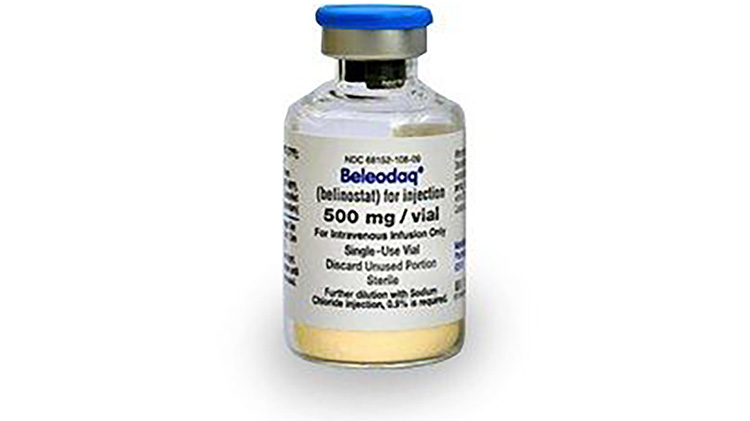Keytruda (pembrolizumab) vs Beleodaq (belinostat)
Keytruda (pembrolizumab) vs Beleodaq (belinostat)
Keytruda (pembrolizumab) is an immune checkpoint inhibitor that works by blocking the PD-1 protein on cells, which can help the immune system detect and fight cancer cells; it is commonly used for various types of cancers, including melanoma, non-small cell lung cancer, and head and neck squamous cell carcinoma. Beleodaq (belinostat) is a histone deacetylase inhibitor that works by interfering with the function of enzymes involved in the regulation of gene expression, and it is approved for the treatment of peripheral T-cell lymphoma. When deciding between Keytruda and Beleodaq, it is crucial to consider the specific type of cancer being treated, as their mechanisms of action and approved indications differ significantly, and a healthcare provider can offer guidance based on individual patient needs and the latest clinical evidence.
Difference between Keytruda and Beleodaq
| Metric | Keytruda (pembrolizumab) | Beleodaq (belinostat) |
|---|---|---|
| Generic name | Pembrolizumab | Belinostat |
| Indications | Various types of cancers including melanoma, lung cancer, head and neck cancer, Hodgkin lymphoma, and others | Peripheral T-cell lymphoma (PTCL) |
| Mechanism of action | Programmed death receptor-1 (PD-1) blocking antibody | Histone deacetylase inhibitor |
| Brand names | Keytruda | Beleodaq |
| Administrative route | Injection (IV) | Injection (IV) |
| Side effects | Fatigue, musculoskeletal pain, decreased appetite, pruritus, diarrhea, nausea, rash, fever, cough, dyspnea, constipation, pain in extremity, and headache | Nausea, fatigue, fever, anemia, and vomiting |
| Contraindications | Severe hypersensitivity to pembrolizumab or any of its excipients | Severe hypersensitivity to belinostat or any of its components |
| Drug class | Anti-PD-1 monoclonal antibody | HDAC inhibitor |
| Manufacturer | Merck & Co. | Spectrum Pharmaceuticals |
Efficacy
Keytruda (Pembrolizumab) Efficacy in Lymphoma
Keytruda, generically known as pembrolizumab, is a monoclonal antibody that has been utilized in the treatment of various types of cancer, including lymphoma. Specifically, it has shown promise in treating Hodgkin lymphoma (HL) and primary mediastinal large B-cell lymphoma (PMBCL), a type of non-Hodgkin lymphoma. Pembrolizumab works by targeting and inhibiting the programmed death receptor-1 (PD-1) pathway, which is a mechanism that tumors use to evade the immune system. By blocking this pathway, Keytruda can enhance the body's immune response against cancer cells.
In clinical trials, pembrolizumab has demonstrated significant efficacy in patients with relapsed or refractory classical Hodgkin lymphoma. The drug has been granted approval by the U.S. Food and Drug Administration (FDA) for the treatment of adult and pediatric patients with refractory classical HL or who have relapsed after three or more prior lines of therapy. The response rates in these settings have been encouraging, with a notable proportion of patients achieving complete or partial remission.
Beleodaq (Belinostat) Efficacy in Lymphoma
Beleodaq, known by its generic name belinostat, is a histone deacetylase inhibitor approved for the treatment of relapsed or refractory peripheral T-cell lymphoma (PTCL). PTCL is a diverse group of aggressive non-Hodgkin lymphomas that originate from T-cells. Beleodaq works by interfering with the expression of genes that are necessary for cancer cell growth and survival, leading to cell cycle arrest and apoptosis of cancer cells.
The efficacy of Beleodaq in PTCL was evaluated in a multicenter, single-arm clinical trial that led to its accelerated approval by the FDA. In this trial, belinostat demonstrated an overall response rate with some patients achieving complete or partial remission. The duration of response varied among patients, and the drug provided a new treatment option for patients with PTCL who have limited therapies available after first-line treatment failure. As with all accelerated approvals, continued approval for this indication may be contingent upon verification and description of clinical benefit in confirmatory trials.
Regulatory Agency Approvals
Keytruda
-
European Medical Agency (EMA), European Union

-
Food and Drug Administration (FDA), USA

-
Health Canada

-
Therapeutic Goods Administration (TGA), Australia

-
Medsafe (NZ)

Beleodaq
-
Food and Drug Administration (FDA), USA

Access Keytruda or Beleodaq today
If Keytruda or Beleodaq are not approved or available in your country (e.g. due to supply issues), you can access them via Everyone.org.
How it works

Make an enquiry
Choose the medicine you want to buy, answer a couple of questions, and upload your prescription to speed things up. We’ll get back to you within 24 hours.


Make an enquiry
Choose the medicine you want to buy, answer a couple of questions, and upload your prescription to speed things up. We’ll get back to you within 24 hours.


Breeze through the paperwork
We'll guide you through the required documents for importing unapproved medicine, ensuring you have all the necessary information.


Get a personalized quote
We’ll prepare a quote for you, including medicine costs and any shipping, administrative, or import fees that may apply.


Receive your medicine
Accept the quote and we’ll handle the rest - sourcing and safely delivering your medicine.

Some text on this page has been automatically generated. Speak to your physician before you start a new treatment or medication.
Let's talk
If you have any questions, call us or send us a message through WhatsApp or email:
Contact us




